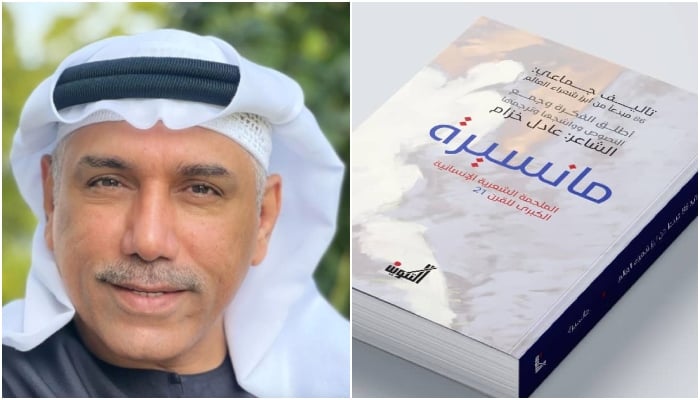
In a unique international poetry project, the Emirati writer and poet Adel Khuzam, the pioneer of literary modernism in the United Arab Emirates and the Arabian Gulf, launched an international poetic epic entitled Mansoura.
The collective work was co-authored by 86 poets from more than 50 countries, including Pakistan, and offers a poetic reflection on what can be described as a “human odyssey.”
The project, which is the first of its kind and size in the history of global poetry, aims to present a global poetic text that expresses the contemporary human experience, its concerns, hopes and dreams in light of the challenges of the twenty-first century.
The Arabic version was issued by Dar Al-Takween in its new branch in Sharjah, United Arab Emirates, and Khozam chose the Sharjah International Book Fair 2024 as a platform to launch this ambitious project, in appreciation of this global cultural institution.
Khozam is currently working on publishing the book in major international languages, and versions in English, Spanish, Chinese and Bengali are currently being prepared.
The Emirati writer is known as one of the most prominent poets of the Arab Gulf on the global scene. He published more than twenty works ranging from poetry, novels, philosophy, studies and translations.
Throughout his literary career, he received many awards at poetry festivals in India, China, the United States, Europe, and Russia. It is worth noting that he launched the World Poetry Tree anthology, which includes contributions from more than 400 poets from 106 countries, during the UAE’s hosting of Expo 2020 Dubai.
The voice of the world’s poets
In his introduction to the book, Khuzam said that joint authorship has always been an area of experimentation for many poets throughout history. In fact, many poets have composed and expanded upon many ancient epics across different eras.
This reflects that while some may consider literature a personal endeavour, great epics often take on a collective nature, even if attributed to a single poet.
Khuzam points out in his introduction that this epic presents a new poetic form that embodies an endless array of poetic, narrative, and stylistic techniques, including fragments, short passages, direct explanatory passages, and symbolic allusions.
Together, these elements create a unique and innovative textual and discursive structure. At the same time, the epic demonstrates the limitless power of language to convey ideas in forms that, although sometimes conflicting, can fuse artistically to create a new exploratory text within literary practice.
It is worth noting that this endeavor draws from languages around the world, and produces a universal poetic work capable of expressing the essence of the human experience today.
Global and Arab presence
The Al-Mansirah epic was co-authored by a distinguished group of famous poets from different parts of the world. These include:
1. Paolo Rovelli – Italy
2. Germain Drogenbrot – Belgium
3. Saif Al Rahbi – Amman
4. Alvaro Mayo – Portugal
5. Chris Salt – United Kingdom
6. Conceição Lima – Sao Tome and Principe
7. Shurouk Hammoud – Syria
8. Eugenia Sanchez Nieto – Colombia
9. Kimogitsi Joseph Mullabong – Namibia
10. Zakia Al-Marmouk – Morocco
11. Irma Kurti – Albanian
12. Beppe Costa – Italy
13. Abdukhur Kosem – Tajikistan
14. Yuri Talvet – Estonia
15. Zhang Zhe – China
16. Nahid Kabiri – Iran
17. Maria Chap – Argentina
18. Ayo Ayola Amali – Nigeria
19. Shirani Rajapakse – Sri Lanka
20. Tariq Al-Tayeb – Sudan
21. Jalal Zangabadi – Iraqi Kurdistan
22. Moez Majed – Tunisia
23. Les Weeks – Australia
24. Taiko Uemura – Japan
25. Kwazi Ndlangisa – South Africa
26. Zahir Al Ghafri – Oman
27. Paul Lingard Damgaard – Denmark
28. Sue Chu – New Zealand
29. Hamid Al-Arabi – Algeria/France
30. Renato Sandoval Bacigalupo – Peru
31. Tendo Taijin – Japan
32. Francis Kurkiewicz – Brazil
33. Maria Gresh cattle – Malta
34. Saad Al-Dosari – Saudi Arabia
35. Lee Kuei Shin – Taiwan
36. Bassam Johar – Yemen
37. Wansoo Kim – South Korea
38. Such as Sywor Commander – Congo
39. Ghassan Zaqtan – Palestine
40. Dimitris B. Kraniotis – Greece
41. Mahmoud Qarani – Egypt
42. Siamir Marulavau – Indonesia
43. Katharine Graham – Canada
44. Yolanda Felicita Rodriguez Toledo – Cuba
45. Hamdi Mika – Albania
46. Rahim Karim – Kyrgyzstan
47. Jordi Valls – Spain
48. Anna Kitts – United States
49. Muhsin Al-Ramli – Iraq
50.Stoyanka Boyanova – Bulgaria
51. Tabassum Tehmina Shagufta Hussain – Bangladesh
52. Rosabelle Ellis – Aruba
53. Dr. Aprilia Zank – Germany
54. Fernando Rendon – Colombia
55. Aminur Rahman – Bangladesh
56.Youssef Abu Loz – Jordan
57. Agnes Meadows – United Kingdom
58. Kholoud Al Mualla – UAE
59. Khaled Al-Badour – UAE
60. Jane Hirschfield – United States
61. Fiona Sampson – United Kingdom
62. Hani Royler – Netherlands
63. Azam Abidov – Uzbekistan
64. Laila Al-Sayed – Bahrain
65. Thor Stefansson – Iceland
66. Anne Casey – Ireland
67. George Wallace – United States
68. D. Naila Hina – Pakistan
69. Fadil Jamili – Pakistan
70. Eliza Sigit – Poland
71. My Van Van – Vietnam
72. Youssef Kadel – Mauritius
73. Keshab Sigdel – Nepal
74. D. Fawzia Abu Khaled – Saudi Arabia
75. Vadim Terekhin – Russia
76. Rati Saxena – India
77.Naida Mokic – Bosnia and Herzegovina
78. Anna Kiko – China
79. Mariko Sumikura – Japan
80. Francis Coombs – France
81. Norduran Doman – Türkiye
82. Ashraf Aboul-Yazid – Egypt
83. Adamu IDE – Niger
84. Alvinus Milius – Saint Lucia
85. Kao Shui – China
86. Nada Onsi Al-Hajj – Lebanon
